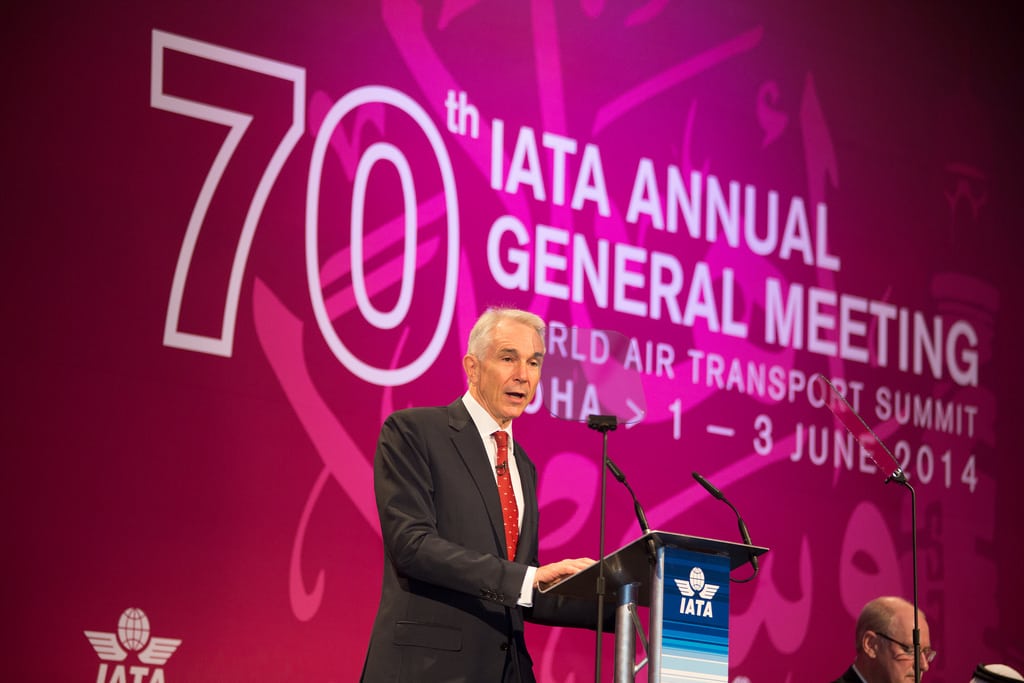Skift Take
Of course Tyler will advocate for fewer taxes and regulations, but he'd most like to see the Single European Skies plan actually put in place.
Tony Tyler, Director General and CEO of IATA, called on European governments to rethink their tax policies and regulatory strategies, claiming that these put the region and the various European carriers at a competitive disadvantage and at risk, in a keynote address to the European Civil Aviation Conference (ECAC) during a meeting on European air transport competitiveness in Vienna last week.
“There is a very long list of things that Europe can and should do to improve the operating environment for its aviation sector. And the motivation for that is because aviation generates jobs and grows the economy through connectivity. A successful aviation sector improves European competitiveness” said Tyler.
Citing Europe’s deficiencies in “foundation of its air transport sector—safety, security and sustainability—based on global standards,” Tyler urged governments to “address the competitive disadvantages they generate in the areas of taxation, regulation and infrastructure,” according to an announcement from IATA.
“Among the biggest obstacles faced by European airlines are the competitive disadvantages placed in their way by Europe’s governments. The region’s airlines are over-taxed and onerously regulated. Moreover, they suffer from a chronically mismanaged air traffic management system, insufficient airport capacity and infrastructure costs that are simply too expensive. It’s time to do something about it,” said Tyler.
Tyler also repeated the importance of supporting the Single European Skies (SES) program, saying:
“SES will reduce delays, cut emissions, raise safety levels and contribute to the creation of 320,000 jobs across Europe. It is critical for Europe’s future, but progress has been frustratingly slow and the costs are enormous. Consumers lose EUR 6 billion in time and productivity on top of which is the EUR 3 billion burden on operations and 7.8 million tonnes of unnecessary carbon emissions. The leadership of individual states is needed to turn Europe’s air navigation service monopolies into customer-focused and cost-effective members of the air transport value chain.”
The IATA announcement outlines the objectives of SES and Tyler’s views on progress in their announcement as follows:
Single European Sky: The priority list for infrastructure is topped by the Single European Sky (SES) and Tyler called for strong support of the SES2+ package to clear the way for rapid progress on this long-delayed project. This package of measures has three vital elements:
- Establishment of an independent economic regulator for European air navigation performance. When combined with the strengthened target setting authority of the Commission, it will ensure appropriate recognition and equitable contributions from all member states. Greater independence of the National Supervisory Authorities will also be a key enabler of better performance.
- Re-organization and unbundling of ATM support services. “Europe’s competitive position cannot afford to be compromised by the enormous costs of duplicated and often-times incompatible support services. The EUR 30 billion investments in SESAR cannot be justified if organizational inefficiencies are not eliminated,” said Tyler.
- Provision of an effective framework for Functional Airspace Blocks (FABs) to deliver value. Today FABs exist on paper, but we have not seen any reduction in fragmentation or the optimization of airspace, human and technical resources that they were meant to achieve. “All they have done so far is to provide a fig-leaf to cover a complete lack of forward progress on the part of Europe’s community of air navigation service providers,” said Tyler.
Tyler also identified a need to better regulate European airports:
“As a basic principle, we believe that airports need effective economic regulation to achieve three goals starting with providing protection from excessive charges. Regulation must also incentivize efficiency gains and drive service quality levels. Finally, it should aim to maximize the value of investments by aligning with customer needs through true and transparent consultation processes,” said Tyler.
Tyler also had words about Europe’s taxation policies:
“In 2014, the European governments will collect nearly $40 billion in taxes from airlines and passengers. To put that into perspective, that is more than double the taxes collected in the Asia-Pacific region. Many governments there value aviation more for the long-term economic value that the industry makes possible, than for short-term tax receipts,” said Tyler.
And said of Europe’s Passenger Rights regulations (EU 261): “Passenger Rights is a good example of where European regulation has got it wrong.”
In closing, he encouraged European governmental and regulatory attendees to rethink their existing policies and strategies saying:
“I cannot express the need for SES2+ strongly enough. The leadership of individual states is needed to turn Europe’s air navigation service monopolies into customer-focused and cost-effective members of the air transport value chain… Europe’s air transport sector is in desperate need of leadership to alleviate the tax burden, improve regulation based on global standards and develop infrastructure to enable success. We are counting on ECAC to be a strong force for much-needed progress and set the stage for aviation to make an even greater contribution to European development in its next century.”
The Daily Newsletter
Our daily coverage of the global travel industry. Written by editors and analysts from across Skift’s brands.
Have a confidential tip for Skift? Get in touch
Tags: iata
Photo credit: Tony Tyler, the CEO of IATA, at his speech in global meeting in Doha. Courtesy IATA
